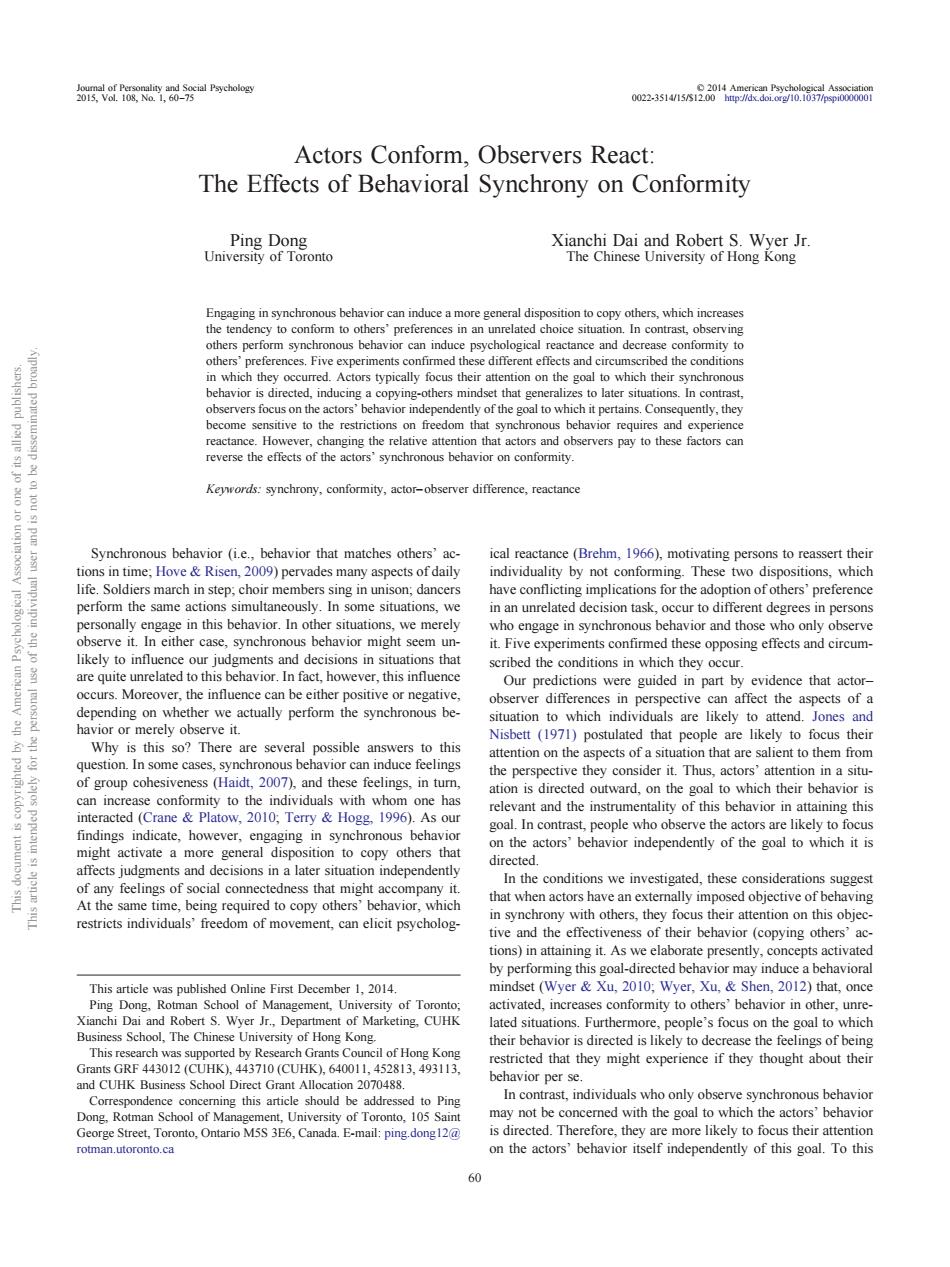正在加载图片...

置芳内a 0e2.351ss924 Actors Conform,Observers React: The Effects of Behavioral Synchrony on Conformity Uno XacaPandRoeta Engaging in synchr as behavior can induce a m eral dis others,which increa ity,c nally engas or might scem u it.Five experiments confirmed these opposing effects and circum are like r or merely can induce .Ih actors of group cohesi chess (Hai dt.2007 and these。 tntionnasitu acted (2010:Terry 2 1996).As our ngs indic howeve engaging behavio ected later At the same In the alled.the h restricts individuals'freedom of movement.can elicit psycholog- n synchrony with others,they focus their attention on this objec ive and the efe behavior (copying irected beh or may induce a behavioral r1,2014 012)that,once Jr..D CUHK D 2070488. is directed.Therefore.they are more likely to focus their attention on the actors"behavior itself independently of this goal.To this 60Actors Conform, Observers React: The Effects of Behavioral Synchrony on Conformity Ping Dong University of Toronto Xianchi Dai and Robert S. Wyer Jr. The Chinese University of Hong Kong Engaging in synchronous behavior can induce a more general disposition to copy others, which increases the tendency to conform to others’ preferences in an unrelated choice situation. In contrast, observing others perform synchronous behavior can induce psychological reactance and decrease conformity to others’ preferences. Five experiments confirmed these different effects and circumscribed the conditions in which they occurred. Actors typically focus their attention on the goal to which their synchronous behavior is directed, inducing a copying-others mindset that generalizes to later situations. In contrast, observers focus on the actors’ behavior independently of the goal to which it pertains. Consequently, they become sensitive to the restrictions on freedom that synchronous behavior requires and experience reactance. However, changing the relative attention that actors and observers pay to these factors can reverse the effects of the actors’ synchronous behavior on conformity. Keywords: synchrony, conformity, actor– observer difference, reactance Synchronous behavior (i.e., behavior that matches others’ actions in time; Hove & Risen, 2009) pervades many aspects of daily life. Soldiers march in step; choir members sing in unison; dancers perform the same actions simultaneously. In some situations, we personally engage in this behavior. In other situations, we merely observe it. In either case, synchronous behavior might seem unlikely to influence our judgments and decisions in situations that are quite unrelated to this behavior. In fact, however, this influence occurs. Moreover, the influence can be either positive or negative, depending on whether we actually perform the synchronous behavior or merely observe it. Why is this so? There are several possible answers to this question. In some cases, synchronous behavior can induce feelings of group cohesiveness (Haidt, 2007), and these feelings, in turn, can increase conformity to the individuals with whom one has interacted (Crane & Platow, 2010; Terry & Hogg, 1996). As our findings indicate, however, engaging in synchronous behavior might activate a more general disposition to copy others that affects judgments and decisions in a later situation independently of any feelings of social connectedness that might accompany it. At the same time, being required to copy others’ behavior, which restricts individuals’ freedom of movement, can elicit psychological reactance (Brehm, 1966), motivating persons to reassert their individuality by not conforming. These two dispositions, which have conflicting implications for the adoption of others’ preference in an unrelated decision task, occur to different degrees in persons who engage in synchronous behavior and those who only observe it. Five experiments confirmed these opposing effects and circumscribed the conditions in which they occur. Our predictions were guided in part by evidence that actor– observer differences in perspective can affect the aspects of a situation to which individuals are likely to attend. Jones and Nisbett (1971) postulated that people are likely to focus their attention on the aspects of a situation that are salient to them from the perspective they consider it. Thus, actors’ attention in a situation is directed outward, on the goal to which their behavior is relevant and the instrumentality of this behavior in attaining this goal. In contrast, people who observe the actors are likely to focus on the actors’ behavior independently of the goal to which it is directed. In the conditions we investigated, these considerations suggest that when actors have an externally imposed objective of behaving in synchrony with others, they focus their attention on this objective and the effectiveness of their behavior (copying others’ actions) in attaining it. As we elaborate presently, concepts activated by performing this goal-directed behavior may induce a behavioral mindset (Wyer & Xu, 2010; Wyer, Xu, & Shen, 2012) that, once activated, increases conformity to others’ behavior in other, unrelated situations. Furthermore, people’s focus on the goal to which their behavior is directed is likely to decrease the feelings of being restricted that they might experience if they thought about their behavior per se. In contrast, individuals who only observe synchronous behavior may not be concerned with the goal to which the actors’ behavior is directed. Therefore, they are more likely to focus their attention on the actors’ behavior itself independently of this goal. To this This article was published Online First December 1, 2014. Ping Dong, Rotman School of Management, University of Toronto; Xianchi Dai and Robert S. Wyer Jr., Department of Marketing, CUHK Business School, The Chinese University of Hong Kong. This research was supported by Research Grants Council of Hong Kong Grants GRF 443012 (CUHK), 443710 (CUHK), 640011, 452813, 493113, and CUHK Business School Direct Grant Allocation 2070488. Correspondence concerning this article should be addressed to Ping Dong, Rotman School of Management, University of Toronto, 105 Saint George Street, Toronto, Ontario M5S 3E6, Canada. E-mail: ping.dong12@ rotman.utoronto.ca This document is copyrighted by the American Psychological Association or one of its allied publishers. This article is intended solely for the personal use of the individual user and is not to be disseminated broadly. Journal of Personality and Social Psychology © 2014 American Psychological Association 2015, Vol. 108, No. 1, 60 –75 0022-3514/15/$12.00 http://dx.doi.org/10.1037/pspi0000001 60